Killing Bono Blu-ray Movie
HomeKilling Bono Blu-ray Movie 
Arc Entertainment | 2010 | 114 min | Rated R | Aug 07, 2012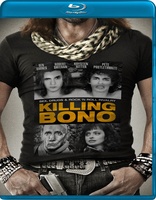
Movie rating
6.1 | / 10 |
Blu-ray rating
| Users | 2.0 | |
| Reviewer | 4.0 | |
| Overall | 3.4 |
Overview
Killing Bono (2010)
A dark comedy about the people who <i>don't</i> find fame and fortune, the film is loosely based on the lives of brothers Neil and Ivan McCormick, who grew up with the members of U2 and played in a rival band, only to watch their former schoolmates become world famous while the McCormick brothers continued to struggle for recognition.
Starring: Ben Barnes, Robert Sheehan, Krysten Ritter, Stanley Townsend, Pete PostlethwaiteDirector: Nick Hamm
| Music | Uncertain |
| Dark humor | Uncertain |
| Comedy | Uncertain |
Specifications
Video
Video codec: MPEG-4 AVC
Video resolution: 1080p
Aspect ratio: 2.40:1
Original aspect ratio: 2.39:1
Audio
English: DTS-HD Master Audio 5.1
Subtitles
English SDH
Discs
25GB Blu-ray Disc
Single disc (1 BD)
Playback
Region A (B, C untested)
Review
Rating summary
| Movie | 4.0 | |
| Video | 4.0 | |
| Audio | 3.5 | |
| Extras | 2.5 | |
| Overall | 4.0 |
Killing Bono Blu-ray Movie Review
Killing Me Loudly with His Song
Reviewed by Michael Reuben February 29, 2012The most delicious irony about the title Killing Bono is that it was suggested by the U2 frontman himself. "If you want your life back, you'll have to kill me," he jokingly told his childhood friend, rock critic Neil McCormick, on whose memoir the film is loosely (very loosely) based. As schoolmates, McCormick and the Irishman Formerly Known as Paul Hewson both wanted to be rock stars, and McCormick's brother, Ivan, briefly played in Hewson's band, which was then called "The Feedbacks". But not everyone can be a star. Hewson and his band became Bono and U2, while the McCormick brothers hit one snag after another. Bono would eventually tell McCormick that they were cosmic opposites and that McCormick had "soaked up" all of Bono's bad luck, inspiring McCormick to subtitle his book "I Was Bono's Doppelgänger". Director Nick Hamm was attracted to McCormick's story because of what it was not—namely, not a classic bio-pic of a show business icon. McCormick's was the story of most people, who don't grow up to fame, glory and success, but have to reckon with an ordinary life, except that McCormick's tale had the recurrent frisson of constantly rubbing shoulders with someone who'd made it. Hamm optioned the book and began the six-year ordeal of developing a script and raising the financing, a process that McCormick would later call "so soul-destroying, it makes rock-and-roll look easy". After fourteen rewrites, the story had been heavily fictionalized in ways that McCormick found unnerving, even if the core of the experience remained intact. The film now opens with the title's jokey metaphor transformed into literal fact, as McCormick aims a real gun at his former school chum (something that never happened, except possibly in McCormick's imagination). Of course, by the end that opening scene is revealed to be more complicated than it first appears. Hamm and his inventive screenwriters, who included Dick Clement and Ian La Frenais (The Commitments, The Bank Job and Flushed Away), transformed McCormick's life into a mordantly witty absurdist comedy filled with surreal touches in which, as McCormick would later say, "I still don't get to be a rock star, but I do get the best lines". He also got to be played by actor Ben Barnes, who was Prince Caspian in the Narnia series and who, as the vintage photos accompanying the credits demonstrate, is a lot handsomer than McCormick ever was.
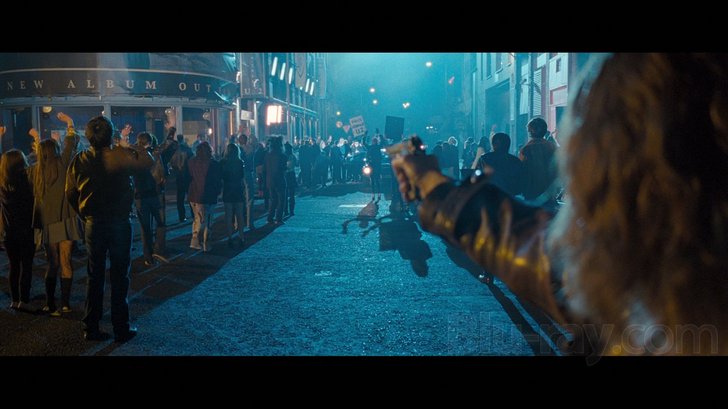
The film opens in 1987, as U2 are in Dublin to promote the release of the Joshua Tree album. An overwrought Neil McCormick (Barnes) is ranting hysterically about Bono as his car speeds through the narrow streets. There's some sort of accident, then Barnes exits and points a gun in Bono's direction. Eleven years earlier, Neil, his brother Ivan (Robert Sheehan), Bono (Martin McCann) and The Edge (Mark Griffin) are all at school together, dreaming of rock glory. They form rival bands, but Bono (who isn't yet calling himself "Bono") thinks Ivan can really play and tells Neil they want him for their band. Neil says Ivan's with him, and Bono backs off. Neil never tells Ivan he could have played with U2 (though Ivan will eventually find out). The decision haunts him for years. The McCormick brothers' struggle to make it in rock-and-roll is a non-stop comedy of errors and bad timing. As tempting as it is to list the madcap string of outrageous misfortunes, I don't want to spoil it for first-time viewers. Let's just say that they're constantly being upstaged by bigger events or outflanked by unforeseen developments. You get to the point where you can feel the next disaster coming, and you start looking for the trap door that will inevitably open beneath them just as they're about to grab the brass ring. More than a few of the mishaps are Neil's own fault. Like his old friend Bono, he's brash and immodest, but he lacks the crucial instinct for choosing the right path that is an essential component of a successful career. Perhaps his single worst decision (other than keeping Ivan out of U2) is to seek financial support from the "employer" of another former schoolmate, a delinquent known as Plugger (Diarmuid Noyes), who works for an old-fashioned gangster named Danny Machin (Stanley Townsend). Machin is a larger-than-life Irish character who operates out of a strip club on the outskirts of Dublin. He keeps an array of fearsome carving tools on display as a caution to anyone who might defy him, but shows his cultured side through an ever-present copy of James Joyce's A Portrait of the Artist as a Young Man. After playing a gig at Machin's club, Neil manages to talk the self-styled "entrepreneur" into investing $10,000 in his career, which is enough to get Neil and Ivan to London for further misadventures. They lease an old factory space of an apartment (it looks like a set for Rent) from a gay landlord, Karl (Pete Postlethwaite), who seems to know everyone, and Neil develops an instant crush on their neighbor, a punk rock girl named Gloria (Krysten Ritter), whom he will eventually persuade to manage the band. But they can't land a contract to tour or record. Meanwhile, Plugger keeps calling for a progress report on Machin's investment. Eventually, the burly gangster himself intervenes to make things happen with a producer, and the band begins to tour—and that's when things really fall apart, and the film loops back to the opening sequence, but now with an expanded view of events. Since we all know that Bono was neither killed nor even shot at, the opening turns out to be an elaborate shaggy dog story that ties up all the film's narrative strands and leads to a neat summation of the frustrations of Neil McCormick's ill-fated music career. Or as the real Neil McCormick put it so well:
As a deluded, fame-obsessed young man, of course, I never doubted that one day someone would make a film of my life. It just never occurred to me it would be a comedy.
Killing Bono Blu-ray Movie, Video Quality 
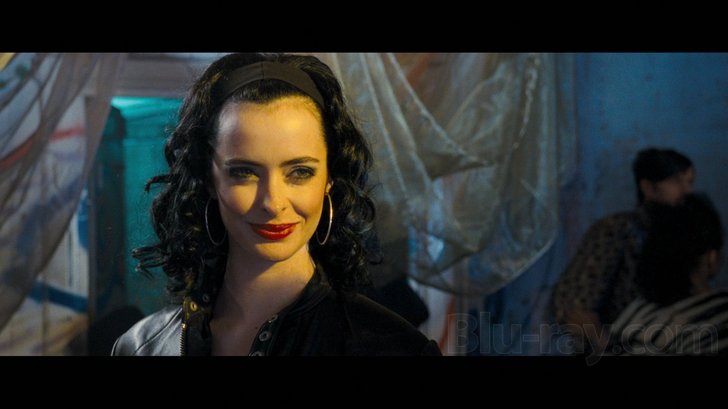
Killing Bono was shot by Kieran McGuigan, who is used to working with tight budgets in both TV and independent features like The Whistleblower. According to IMDb, the shooting format was Techniscope, which is the poor man's Cinemascope created in Italy in the Sixties, frequently used by Sergio Leone and making something of a comeback now that digital intermediates can be employed to overcome its limitations. (And no, it's not Super35; you can look up the differences.) Shooting in Belfast to get the look and feel of Dublin in the Seventies and Eighties, McGuigan has created a wide array of palettes and textures for Killing Bono, from the surreal, almost fluorescent sheen of the 1987 sequence that opens the film to the gritty, earth-toned origins of the Bono/McCormick rivalry in the mid-Seventies. All of these are smoothly reproduced on Arc's 1080p, AVC-encoded Blu-ray, which features deep blacks (where appropriate), fine detail and a natural-looking grain structure that one must look hard to notice. Colors range from faded (e.g., in the brothers' London flat) to fully saturated (check out the reds at Machin's club). There's no sign of high frequency filtering or artificial sharpening, nor did I spot any compression artifacts.
Killing Bono Blu-ray Movie, Audio Quality 
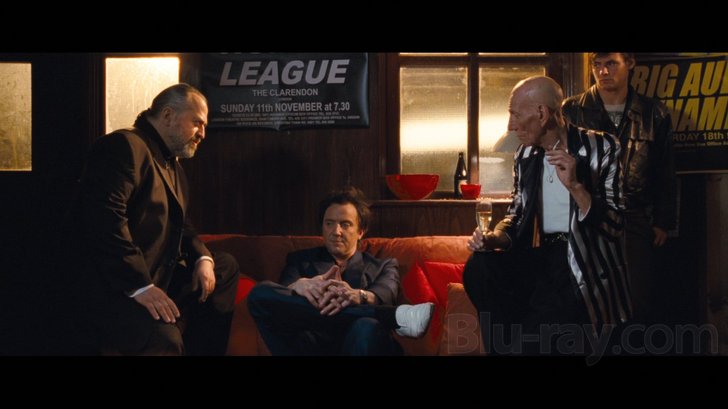
Music is the most critical component of Killing Bono's DTS-HD MA 5.1 track, and one of the mix's interesting features is how effectively it recreates realistic sound for the eras and venues represented. In the early portions of the film, when Ivan McCormick and the future U2 are rehearsing, they sound like teenagers jamming at home, which is to say, they sound terrible. Later, as the various incarnations of the McCormick brothers' band move into local venues and, eventually, go on the road, we get the muddy mix, overloaded amps and boomy bass familiar from sound systems that have seen better days. The best-sounding songs are usually heard in the distance, and they're almost always by U2. Wait until the credits, though, for a medley of studio recordings of the McCormick brothers' songs as well as songs written for the film by "Joe Echo"; they may not have the iconic heft of U2's hits, but they're good tunes. Other than to support the music, the surround channels are used sparingly. Dialogue is always clear, assuming one has no trouble with Irish accents. (If you do, there are subtitles.)
Killing Bono Blu-ray Movie, Special Features and Extras 
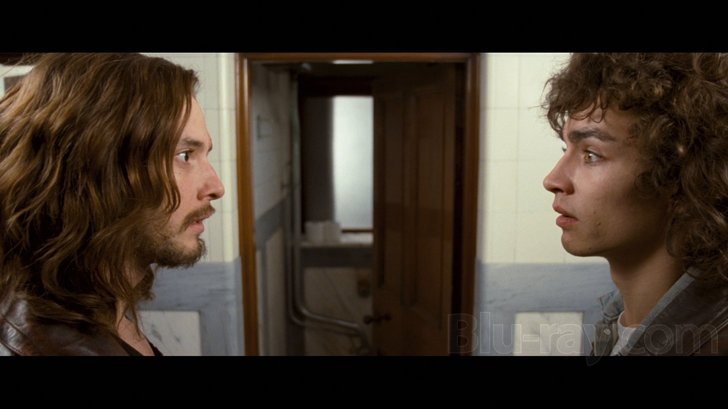
- An In-Depth Look at the Making of Killing Bono (SD; 1.78:1; 22:35): This is an informative featurette that includes interviews with Hamm, McCormick, Barnes, Sheehan and Postlethwaite, among others, and also offers some entertaining behind-the-scenes footage.
- Theatrical Trailer (HD, 1080p; 2.35:1; 2:01): An accurate trailer that aptly captures the feeling of the film: "A truish story of two brothers who didn't find what they were looking for."
- Bonus Trailers: At startup the disc plays trailers (in 1080p) for Knuckle, Seducing Charlie Barker and The Way. These can be skipped with the chapter forward button and are not otherwise available once the disc loads.
Killing Bono Blu-ray Movie, Overall Score and Recommendation 
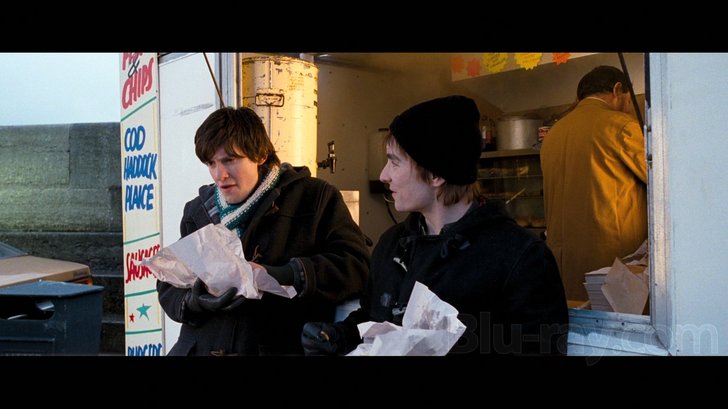
In addition to its other virtues, Killing Bono is the final film of the great Irish actor Pete Postlethwaite, whose long battle with cancer ended in January 2011. Director Hamm, who had been friends with Postlethwaite for years, has said that he knew during the making of Killing Bono that the end was near. The actor says in the "Making Of" extra that he'd never before played a character like this one, but he brought to the role the same vivid depth that made all of his characters memorable, from the sinister lawyer Kobayashi in The Usual Suspects to the hunter Roland in The Lost World to the gangster Fergie in The Town. Here, as the McCormick brothers' cheerfully dissolute gay landlord, Karl, who insists that there be no sex or drugs on premises unless he's allowed to participate, Postlethwaite manages to convey in a single character the spirit of an entire bohemian culture. You can almost feel the debauched Seventies trailing after him. Highly recommended.
Similar titles
Similar titles you might also like

Car Wash
1976

Springsteen & I
Bruce Springsteen
2013

Queen Rock Montreal & Live Aid
1981

Get Crazy
Flip Out
1983

Hamlet 2
2008

Juliet, Naked
2018

How to Talk to Girls at Parties
2017

Roger Waters: The Wall
2014

Ziggy Stardust and the Spiders from Mars: The Motion Picture
50th Anniversary Edition
1979

Led Zeppelin: Celebration Day
2012

Peter Gabriel: New Blood - Live in London
2011

A Hard Day's Night
1964

Bruce Springsteen & The E Street Band: London Calling: Live In Hyde Park
2009

Jeff Beck: Performing This Week... Live at Ronnie Scott's
2007

The Rocker
Born to Rock Edition
2008

Thank God It's Friday
40th Anniversary Edition
1978

The Rutles: All You Need Is Cash
1978

The Monkees: The Complete Series
Limited Edition to 10,000
1965-1969

Roadie
1980

Monty Python's Flying Circus: The Complete Series 1-4
1969-1974